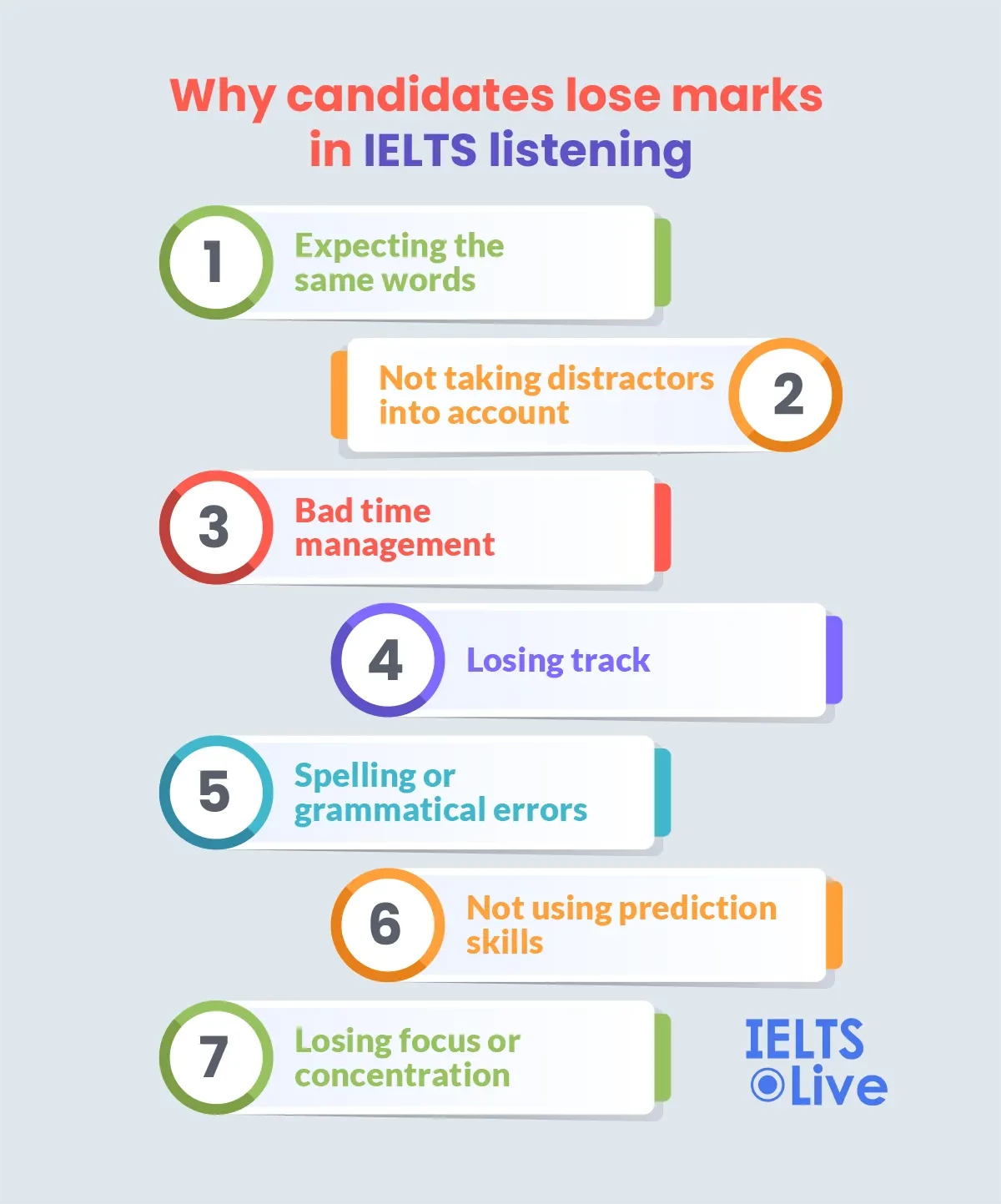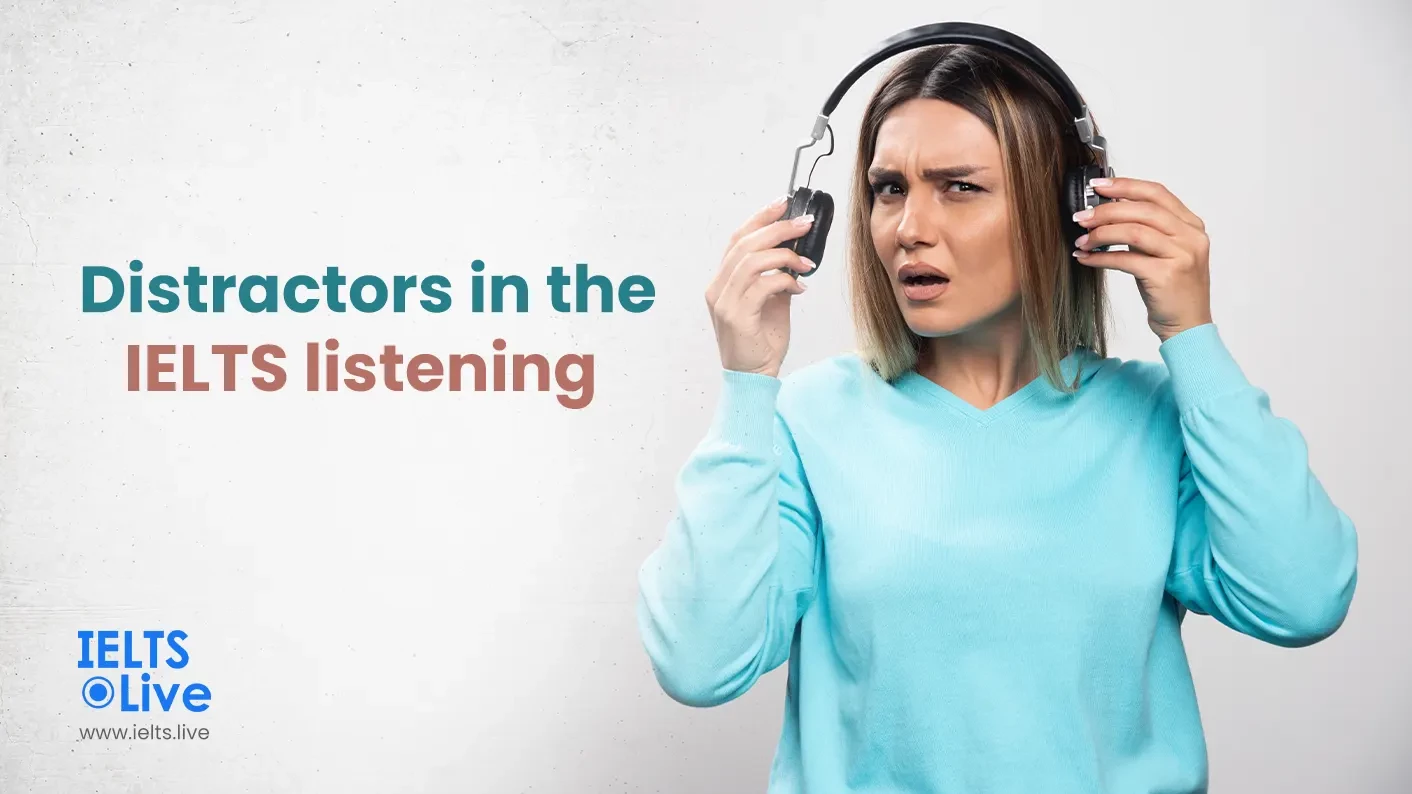
What makes IELTS aspirants lose marks in the listening test?
Dear IELTS aspirants, did you know that even the most seasoned language learners can find the Listening section of the test challenging? A lot of candidates have trouble focusing, paying attention, and managing their time during this section.
As a result, they often lose marks in this area, which can be challenging to make up. One of the main causes of this is the short window of time given to candidates to read the question paper before the audio begins, which causes many of them to feel hurried and unprepared.
But don't worry; in this blog, we'll look at the critical factors leading to IELTS Listening test failure, such as time management, concentration, and comprehension.
So, whether you're a seasoned IELTS pro or a nervous first-timer, keep reading to learn how to maximise your marks and master the Listening section!
One thing that you need to understand about the listening test is that it is easy to do badly in this section unless you have a solid idea of what to expect. The listening test goes by really fast. Or at least that’s what it feels like. But once you understand the test format properly and know what to expect, it’s pretty simple. Now let us start by asking ourselves some questions. See if you can answer them properly.
- Question 1: Do you know how much time you get to settle down and focus before the audio starts to play?
- Question 2: Can you finish reading the questions in the allocated time?
- Question 3: Is your comprehension level good enough to understand the question and the audio being played?
If you can answer these questions, I would say you’ve taken a good amount of time understanding the test. A mistake that many test takers make is that they start opting for the test without having a proper understanding of their own skills. There is no shortcut in IELTS since it tests your skills along with your knowledge. It’s not something you can memorise. There is no fixed formula either. Now let’s look at some of the common things that make candidates lose marks.
Expecting the same words
It is important to remember that the tasks in both IELTS Listening and Reading will frequently test your ability to recognise synonyms. This means that the words in the multiple-choice options are unlikely to match the exact words mentioned/used by the speaker.
For example, in the IELTS Listening section, you may hear the speaker mention "automobile" but the multiple choice options will use synonyms such as "car" or "vehicle." or, you may hear the phrase "solar energy" but the questions may use synonyms like "solar power" or "renewable energy from the sun."
Not taking distractors into account
Another important thing to remember is that the IELTS listening test often contains distractors. What are distractors you ask? They are words and phrases that are put there intentionally to distract you from the real answer.
You should be aware that these distractors will almost certainly appear in the majority of IELTS listening questions. DO NOT JUST ASSUME that the first option you hear is correct.
Consider the speaker's meaning carefully, and be prepared for the speaker to change their mind. Look for words like 'but' and 'however'; these linking words indicate that the answer may not be as simple as it appears.
Bad time management
After each section of the IELTS Listening test, you have time to read. However, one common complaint from IELTS students is that they do not have enough time to properly read the questions before the audio begins and students are unable to comprehend the full meaning of each option in the allotted time.
So what do you do if you face a similar issue? After each section, IELTS gives you some time to go over your answers. If you are confident in your answers, you may proceed to the next section to give yourself more time to read the following questions.
If you are still short on time, you may want to concentrate solely on the question. Take notes on what you hear on your test paper. You can check these notes later, during the transfer time, to find the correct answer.

Losing track
This is another common complaint from the students that they lose their pace while the audio plays. Sometimes when you miss out on one answer you may not realise the speaker has already started talking about the next one.
The listening test is all about being good at multitasking. You need to be aware of the next question along with having the current question on your mind.
Spelling or grammatical errors
The final error that many test takers make is spelling or grammatical errors when writing their answers. Because spelling and grammar are considered in the IELTS listening test, this will have a negative impact on your score.
Before transferring your answers from your question booklet, always write them clearly on the answer sheet and check them for errors. Singular and plural forms, capital letters, punctuation marks, and word limits should all be checked.
Not using prediction skills
Prediction skills can assist you in anticipating the audio content. For example, if you're listening to a conversation between two people about a particular topic, you can use your knowledge of that topic to make educated guesses about what they'll say next.
This can assist you in remaining focused and engaged with the audio, as well as identifying key information more quickly and accurately. Anyone taking the IELTS Listening test should have good prediction skills.
You can improve your focus, accuracy, and efficiency by honing your ability to predict the content and type of questions that may arise, allowing you to maximize your score and avoid losing marks.
Losing focus or concentration
Remember "concentration is key” when it comes to the listening test. The IELTS listening test requires a high level of concentration and attention because you only have one chance to listen to each recording.
However, it is easy to become distracted or lose focus due to external noises, your own thoughts, or your emotions. If this occurs, you may miss critical information or misinterpret what you hear.
To avoid this, try to remain calm and relaxed throughout the test and use techniques to improve your concentration, such as deep breathing, closing your eyes, or mentally repeating keywords.
Lastly, We hope that this blog helped you to be a bit more aware of what the listening test looks like. Remember to pay attention to your comprehension level, be aware of synonyms and distractors, manage your time wisely, and use prediction skills to anticipate audio content.
Multitasking and concentration should be practised throughout the test, and spelling and grammatical errors should be avoided. You'll be able to maximise your marks and ace the Listening section if you keep these pointers in mind.
So, whether you're a seasoned IELTS pro or a nervous first-timer, prepare thoroughly and confidently for the Listening test! Best wishes! We’re always here to help at ielts.live. Make sure to follow our facebook page and subscribe to our youtube channel for further assistance.










0 COMMENTS